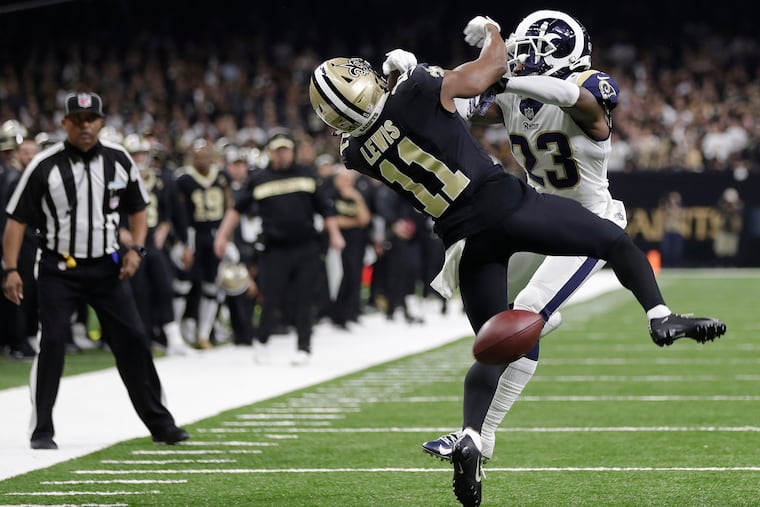Wanna fix NFL officiating? Fine. Just be prepared for unintended and unwanted consequences. | Mike Sielski
The Saints-Rams crew made a bad mistake. But the job has never been more difficult, and the likely “solution” might only make things worse.

Down in New Orleans, they’re losing their minds.
Yeah, yeah, you could say the same thing about any place in America these days. But in the wake of the Saints’ loss to the Los Angeles Rams in Sunday’s NFC championship game — and the officials’ failure to call two late-game penalties, which contributed to the Saints’ demise — disappointment is turning into outrage, which is turning into insanity.
A writer for the New Orleans Advocate newspaper, for instance, asserted that, even though the Saints wouldn’t be going to the Super Bowl, the city should hold a parade anyway because “the fans deserve a chance to come together and feel good again.”
Two Saints fans have filed a lawsuit against the NFL and commissioner Roger Goodell, arguing that officials should have flagged Rams cornerback Nickell Robey-Coleman for pass interference and/or helmet-to-helmet contact against the Saints’ Tommylee Lewis — and that Goodell should use his power as commissioner to change the outcome of Sunday’s game.
And Rep. Cedric Richmond, a Democrat from the 2nd District of Louisiana, said that he already has spoken with other members of the House Judiciary Antitrust Subcommittee about inviting Goodell to “answer some important questions about the unfair call against the Saints.”
Now, the first of these examples is quite silly. (Mardi Gras season began earlier this month; the parades around town have already begun. And if there’s one thing that’s not lacking in New Orleans, it’s the opportunity for people “to come together and feel good.” Trust me. My colleagues and I were there two weeks ago to cover the Eagles-Saints game. We were nothing if not opportunistic.)
But the second two, those are worth taking a bit more seriously, just because they get to the primary concern for the NFL out of that game: the integrity of the sport.
Complaints about NFL officiating have been a drumbeat for years now, but the egregious nature of that Saints-Rams blunder has inspired a campaign for a solution: Allow pass-interference calls, or non-calls, to be reviewable on instant replay.
It sounds simple enough, and it’s an understandable proposal. We the viewers are privy to every available camera angle, and that creates a crisis of credibility for officials when they don’t see something in real time that slow motion makes plain to us. And so, when the league decides change is necessary, the remedy is always the same. Clarify the rule. Expand the rule book and the scope of instant replay. It won’t change the game much. We’ll get it right next time. This will never happen again.
The problem, of course, is that there are always unintended consequences when you’re chasing a quarry — human perfection — that you will never catch.
Let’s assume that the NFL competition committee makes pass interference, a subjective judgment call, reviewable. The league will then have to establish more rules and guidelines for what constitutes pass interference, so that an on-field official has more objective criteria to rely on when weighing whether to call it. Otherwise, the replay official’s judgment will merely be substituted for the on-field official’s, and the credibility questions will remain.
If the league takes those steps, it will have piled more responsibility on a referee’s or back judge’s or linesman’s plate, and if you think that makes officiating or the game itself better, you’re wrong. If anything, the NFL should be headed in the other direction, trying to ease the burden on officials, allowing them to call games with clearer eyes and minds.
Consider: The number of penalties during an NFL season has increased by 12.3 percent over the last decade, according to the database NFLPenalties.com.
I’m open to the possibility that players are committing more infractions, but isn’t the more likely cause of this surge that officials are looking for more potential penalties — and, in turn, throwing more flags — than they ever have? And doesn’t that increase coincide with the perception that officiating is worse than it’s ever been?
This is a point I’ve made in the past, but it’s worth repeating: The more demands you make of officials, the harder their jobs will become.
More, the less appealing their jobs will become. We already have a nationwide shortage of people willing to be referees or umpires at lower levels of athletics. Why would someone pursue NFL officiating as a career or pastime when his/her autonomy and authority can be undermined by the all-seeing eye in the sky — and when that undermining will inevitably lead to ridicule and accusations of incompetence and/or game-fixing, all at his/her expense?
If you put professional officials under more scrutiny in this age of social media and instant, outsize public reaction, with greater attention on and ramifications for their errors, you’ll have fewer people who choose to become officials, and those officials you do end up with will be of lesser quality.
Think about it: Would you want to risk putting up with this backlash? Would you?
The job is more difficult and less desirable than it has ever been. Every second of every game is subject to a level of examination and second-guessing that was once inconceivable. Every snap, handoff, pass, hold, or block in the back is a reason to call an official’s decision into question — and now that’s happening online, in our courts, and in the halls of Congress.
The crew that worked the Saints-Rams game made a mistake, a bad one. But that’s all it was, a mistake, and the ridiculous reactions to it — the shrieks of That’s not fair! Do something about it! I deserve to feel good again! across the digital stratosphere — say more about us than they do about the men who made it.